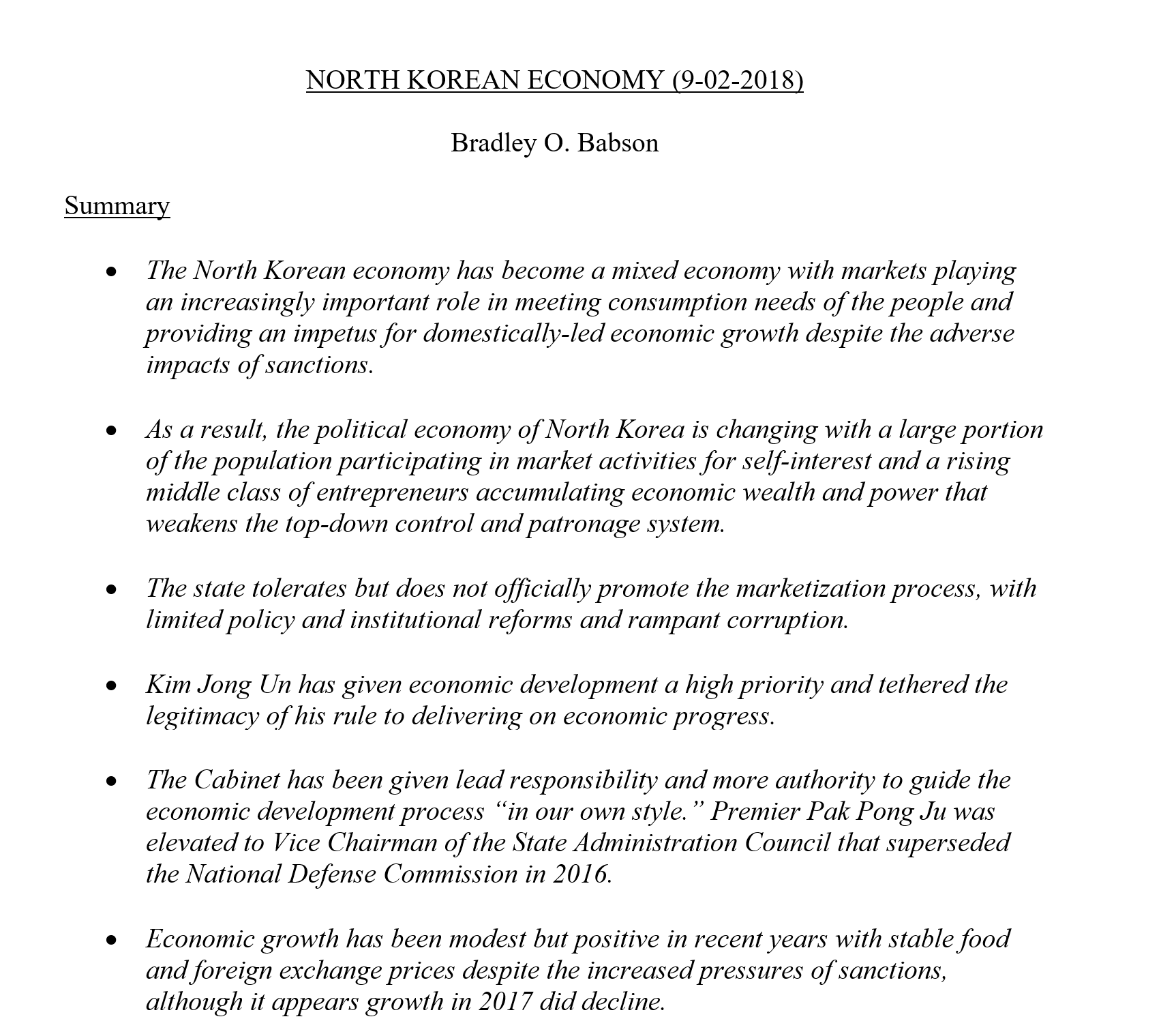Overview of the North Korean Economy and Recent Developments
“Overview of the North Korean Economy and Recent Developments”
SMA hosted a speaker session presented by Brad Babson (The National Committee on North Korea [NCNK]) as a part of its SMA Korea Strategic Outcomes Speaker Series. This speaker session supported SMA’s Korea Strategic Outcomes project. For additional speaker sessions and project publications, please visit the Korea Strategic Outcomes project page.
Date: 6 September 2018
Speaker Session Preview
SMA hosted a speaker session presented by Mr. Brad Babson (The National Committee on North Korea [NCNK]) as a part of its SMA Korea Strategic Outcomes Speaker Series. During his presentation, Mr. Babson discussed the evolutions of the North Korean economic system. He spoke about North Korea’s adoption of a mixed economy, its perceived economic growth over the past 20 years, and the emergence of a growing entrepreneurial middle class that has become less dependent on the state for management and regulation. He also explained that the prices of North Korean goods have remained surprisingly stable despite increased sanctions over the past two years and that the composition of North Korea’s trade has largely remained the same as well. Mr. Babson concluded his presentation by discussing how North Korea has responded to recent sanctions by finding ways to evade these economic restrictions and by becoming more innovative, productive, and self-sufficient.
This speaker session supported SMA’s Korea Strategic Outcomes project. For additional speaker sessions and project publications, please visit the Korea Strategic Outcomes project page.
Speaker Session Recording
Briefing Materials
Biography
Since 1997, Brad Babson has studied the North Korean economy and written extensively on economic perspectives on the integration of North Korea into the international community. He is former Chair of the DPRK Economic Forum at the U.S.-Korea Institute, John Hopkins School of Advanced International Studies, and serves on the Advisory Council of the Korea Economic Institute of America, as well as on the Steering Committee of the National Committee for North Korea.
Mr. Babson is a consultant on Asian affairs with a concentration on North Korea and Myanmar. He worked for the World Bank for 26 years before retiring in 2000. Since then he has consulted for the World Bank and United Nations and been involved in projects sponsored by various institutes, foundations and universities. In Maine, he is President of the Brunswick-Topsham Land Trust and recently has taught a course on the Two Koreas and Geopolitics of Northeast Asia at Bowdoin College.
Recent publications include: “Korean Unification and the Financial System,” International Journal of Korean Studies, Volume XIX, Number 1 (Spring/Summer 2015); “Positive Economic Inducements in Future Negotiations with North Korea,” North Korea Nuclear Futures Series, U.S.-Korea Institute, SAIS, December 2015;
“UNSCR 2270: The Good, the Bad and the Perhaps Surprising Opportunity for the North Korean Economy,” 38 North, March 21, 2016; “The North Korean Economic System: Challenges and Issues,“ International Journal of Korean Studies, Volume XX, Number 1 (Spring/Summer 2016); “Rebooting Inter-Korean Economic Relations: A Challenging Road Ahead,” 38 North, June 18, 2018.
Mr. Babson received his BA degree from Williams College in 1972, and MPA degree from the Woodrow Wilson School of International and Public Affairs at Princeton University in 1974. He lives in Brunswick, Maine.
Paper

Comments